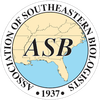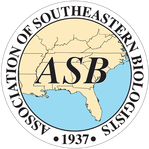ASSOCIATION OF SOUTHEASTERN BIOLOGISTS (ASB)
PROMOTING BIOLOGY THROUGH RESEARCH AND EDUCATION FOR MORE THAN 75 YEARS.
83rd ANNUAL MEETING OF ASB
LITTLE ROCK, ARKANSAS
MARCH 30 - APRIL 02, 2022
NOMINEES FOR ASB 2022 OFFICER ELECTIONS
The following individuals were nominated by the ASB Nominations Committee and have agreed to serve in the indicated capacities if elected. Elections will take place online only. ASB Members will receive an electronic invitation to vote via SurveyMonkey. Each member is limited to a single vote through this e-invitation, and all voting will be anonymous. There are opportunities to indicate write-in candidates on the ballot. Voting for these elections will close at midnight one week prior to the ASB 2022 annual meeting. Results of the election will be announced at the conclusion of the annual meeting.
Nominations will continue to be accepted through February 16, 2022. To nominate someone, fill out a this form.
Nominations will continue to be accepted through February 16, 2022. To nominate someone, fill out a this form.
PRESIDENT ELECT
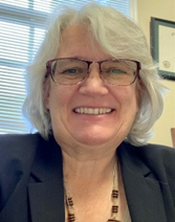
Holly Boettger-Tong, Wesleyan College, Macon, Georgia
Dr. Holly Boettger-Tong is a Professor in the Department of Biology at Wesleyan College in Macon, GA, where she serves as the Division Chair for Natural Sciences and Mathematics. She earned an M.S. and Ph.D. in Biology from the University of Alabama, Birmingham and did her postdoctoral fellowship at the University of Texas Medical Center, Houston, in the Department of Pharmacology. Her research interests are in the area of reproductive and developmental biology and she has supported 19 undergraduate Honors Theses in her lab. In the past ten years, 12 of her students have presented at the ASB Annual Meeting, which is an outstanding venue for young professionals to communicate their research and increase their networking opportunities. Holly has served ASB as Chair of the Education Committee (2016-2020), as an At Large Member of the Executive Committee (2018-2020) and as ASB Vice President (2021-present); she would be honored to continue to serve ASB and to assist in engaging more students and faculty in ASB membership and sponsored initiatives.
Dr. Holly Boettger-Tong is a Professor in the Department of Biology at Wesleyan College in Macon, GA, where she serves as the Division Chair for Natural Sciences and Mathematics. She earned an M.S. and Ph.D. in Biology from the University of Alabama, Birmingham and did her postdoctoral fellowship at the University of Texas Medical Center, Houston, in the Department of Pharmacology. Her research interests are in the area of reproductive and developmental biology and she has supported 19 undergraduate Honors Theses in her lab. In the past ten years, 12 of her students have presented at the ASB Annual Meeting, which is an outstanding venue for young professionals to communicate their research and increase their networking opportunities. Holly has served ASB as Chair of the Education Committee (2016-2020), as an At Large Member of the Executive Committee (2018-2020) and as ASB Vice President (2021-present); she would be honored to continue to serve ASB and to assist in engaging more students and faculty in ASB membership and sponsored initiatives.
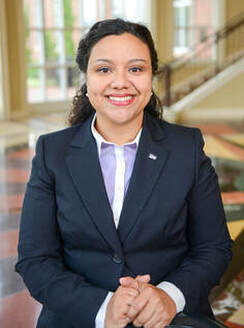
Verónica Segarra, High Point University, High Point, North Carolina
Verónica Segarra completed her PhD in Biophysics and Biochemistry at Yale and her BS in Biochemistry at the University of Miami. She is currently Interim Chair and Assistant Professor of Biology at High Point University, a private liberal arts college in High Point, NC. Her contributions to science have come in the form of research breakthroughs in cell biology in the areas of autophagy and membrane trafficking. Her lab at High Point University is the home base for her research program and a place where undergraduate students receive one‐on‐one mentoring as they develop individual identities in science and research. This is particularly compatible with the mission of ASB and its emphasis on creating a student-friendly environment. The very first conference Dr. Segarra attended with her students as a tenure-track faculty member was an ASB annual meeting. Since then, Dr. Segarra has served ASB as a member and past co-chair of the Human Diversity Committee, and as a member-at-large of the Executive Committee. If elected to future service with ASB, Dr. Segarra would strive to find ways to collect the most appropriate data to assess the progress we are making and guide adjustments towards greater inclusivity and more diverse membership.
Verónica Segarra completed her PhD in Biophysics and Biochemistry at Yale and her BS in Biochemistry at the University of Miami. She is currently Interim Chair and Assistant Professor of Biology at High Point University, a private liberal arts college in High Point, NC. Her contributions to science have come in the form of research breakthroughs in cell biology in the areas of autophagy and membrane trafficking. Her lab at High Point University is the home base for her research program and a place where undergraduate students receive one‐on‐one mentoring as they develop individual identities in science and research. This is particularly compatible with the mission of ASB and its emphasis on creating a student-friendly environment. The very first conference Dr. Segarra attended with her students as a tenure-track faculty member was an ASB annual meeting. Since then, Dr. Segarra has served ASB as a member and past co-chair of the Human Diversity Committee, and as a member-at-large of the Executive Committee. If elected to future service with ASB, Dr. Segarra would strive to find ways to collect the most appropriate data to assess the progress we are making and guide adjustments towards greater inclusivity and more diverse membership.
VICE PRESIDENT
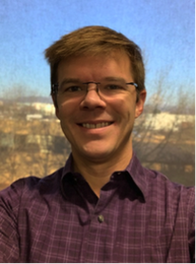
David Giles, University of Tennessee at Chattanooga, Chattanooga, Tennessee
Dr. (Davy) Giles is an associate professor in the Department of Biology, Geology, and Environmental Science at the University of Tennessee at Chattanooga. David was a postdoctoral fellow at the University of Texas at Austin in the Department of Molecular Genetics and Microbiology. He earned a Ph.D. in Biomedical Sciences with a concentration in Microbiology from East Tennessee State University in Johnson City, TN after receiving a B.A. in Biology from Maryville College in Maryville, TN. His research interests are in the area of bacteriology; specifically, his lab examines the utilization of exogenous fatty acids by Gram-negative bacteria for membrane adaptation and phenotypes associated with environmental persistence and virulence. Davy is passionate about undergraduate research, has directed 9 Honors Theses, and has brought 16 students to ASB meetings. In the past 5 years, twenty-one undergraduate trainees have been co-authors on peer-reviewed publications. At UTC he teaches Microbiology, Cell Biology, Human Infectious Disease, and an Honors course on the epidemiology of emerging and reemerging diseases (Deja Flu). A member since 2013, Davy enjoys being a poster/talk judge and has served on the ASB Poster and Presentation Awards Committee (member and chair), the Program Committee (member and chair), and as an At Large Member of the Executive Committee.
Dr. (Davy) Giles is an associate professor in the Department of Biology, Geology, and Environmental Science at the University of Tennessee at Chattanooga. David was a postdoctoral fellow at the University of Texas at Austin in the Department of Molecular Genetics and Microbiology. He earned a Ph.D. in Biomedical Sciences with a concentration in Microbiology from East Tennessee State University in Johnson City, TN after receiving a B.A. in Biology from Maryville College in Maryville, TN. His research interests are in the area of bacteriology; specifically, his lab examines the utilization of exogenous fatty acids by Gram-negative bacteria for membrane adaptation and phenotypes associated with environmental persistence and virulence. Davy is passionate about undergraduate research, has directed 9 Honors Theses, and has brought 16 students to ASB meetings. In the past 5 years, twenty-one undergraduate trainees have been co-authors on peer-reviewed publications. At UTC he teaches Microbiology, Cell Biology, Human Infectious Disease, and an Honors course on the epidemiology of emerging and reemerging diseases (Deja Flu). A member since 2013, Davy enjoys being a poster/talk judge and has served on the ASB Poster and Presentation Awards Committee (member and chair), the Program Committee (member and chair), and as an At Large Member of the Executive Committee.
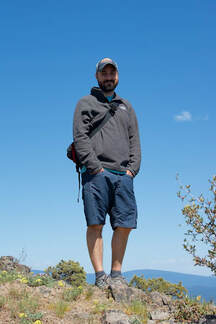
Matt Heard, Belmont University, Nashville, Tennessee
Dr. Matt Heard is an Associate Professor of Biology and the Rob Fisher Endowed Chair of Environmental Science at Belmont University in Nashville, TN. Matt earned his B.A. in Ecology and French at the University of Tennessee at Knoxville in 2004 and his Ph.D. in Ecology & Evolutionary Biology from Brown University in 2012. Matt was the recipient of the Voss Postdoctoral Fellowship in the Environmental Change Initiative at Brown University where he worked between the Ecology & Evolutionary Biology and Epidemiology Departments. Prior to coming to Belmont, Matt was also an Assistant Professor of Biology at Winthrop University in Rock Hill, SC for four years (2012-2016). At Belmont, Matt teaches courses in Biology and Environmental Science for undergraduate students of all levels. Research in his lab focuses on understanding how humans are impacting the world and conducting research on water quality, land-use change, invasive species, and infectious disease outbreaks. Matt has been attending ASB for many years and has served the society in a number of capacities including as an at-large board member since 2019, as a judge for student research presentations, and chairing and serving as a committee member for the Senior Research Award. He was also recipient of ASB’s Senior Research Award at the 2013 Annual Meeting and helped to co-lead an ASB publication on diversity, equity, and inclusion in 2021. In addition, one of Matt’s students won the best student oral presentation in microbiology at ASB. Matt is also an associate editor for Southeastern Naturalist, one of the official journals of ASB.
Dr. Matt Heard is an Associate Professor of Biology and the Rob Fisher Endowed Chair of Environmental Science at Belmont University in Nashville, TN. Matt earned his B.A. in Ecology and French at the University of Tennessee at Knoxville in 2004 and his Ph.D. in Ecology & Evolutionary Biology from Brown University in 2012. Matt was the recipient of the Voss Postdoctoral Fellowship in the Environmental Change Initiative at Brown University where he worked between the Ecology & Evolutionary Biology and Epidemiology Departments. Prior to coming to Belmont, Matt was also an Assistant Professor of Biology at Winthrop University in Rock Hill, SC for four years (2012-2016). At Belmont, Matt teaches courses in Biology and Environmental Science for undergraduate students of all levels. Research in his lab focuses on understanding how humans are impacting the world and conducting research on water quality, land-use change, invasive species, and infectious disease outbreaks. Matt has been attending ASB for many years and has served the society in a number of capacities including as an at-large board member since 2019, as a judge for student research presentations, and chairing and serving as a committee member for the Senior Research Award. He was also recipient of ASB’s Senior Research Award at the 2013 Annual Meeting and helped to co-lead an ASB publication on diversity, equity, and inclusion in 2021. In addition, one of Matt’s students won the best student oral presentation in microbiology at ASB. Matt is also an associate editor for Southeastern Naturalist, one of the official journals of ASB.
MEMBER AT LARGE (two seats)
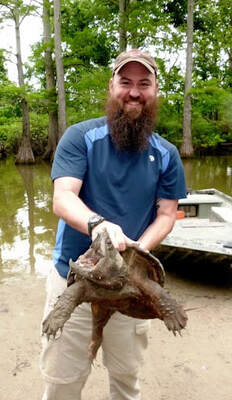
Jon Davenport, Appalachian State University, Boone, North Carolina
Dr. Davenport is an Assistant Professor of Biology at Appalachian State University in Boone, NC. He received his B.A. degree from Maryville College (2003), M.S. from Austin Peay State University, and Ph.D. from East Carolina University (2011). He was also a postdoctoral fellow at the University of Montana from 2011-2014. From 2014-2018, he was an Assistant Professor of Biology at Southeast Missouri State University. He has been teaching at Appalachian since 2018 where he has taught Introductory Biology, Herpetology, Global Change Ecology, and Graduate seminars. His research interests are in the population and community ecology of ectotherms. He is especially fond of salamanders and their role in terrestrial and aquatic communities. He has enjoyed ASB meetings since his M.S. days at Austin Peay and has been a member of ASB since 2012. He currently serves as chair of the ASB Research Award committee.
Dr. Davenport is an Assistant Professor of Biology at Appalachian State University in Boone, NC. He received his B.A. degree from Maryville College (2003), M.S. from Austin Peay State University, and Ph.D. from East Carolina University (2011). He was also a postdoctoral fellow at the University of Montana from 2011-2014. From 2014-2018, he was an Assistant Professor of Biology at Southeast Missouri State University. He has been teaching at Appalachian since 2018 where he has taught Introductory Biology, Herpetology, Global Change Ecology, and Graduate seminars. His research interests are in the population and community ecology of ectotherms. He is especially fond of salamanders and their role in terrestrial and aquatic communities. He has enjoyed ASB meetings since his M.S. days at Austin Peay and has been a member of ASB since 2012. He currently serves as chair of the ASB Research Award committee.
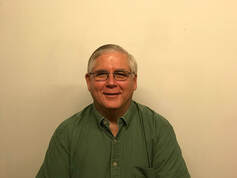
Dennis Haney, Furman University, Greenville, South Carolina
Dr. Dennis Haney is a Professor in the Biology Department at Furman University in Greenville, South Carolina, having been at Furman University since 1997. He received a B.A. in Biology at the University of California, San Diego, a M.S. in Zoology from Oregon State University, and a Ph.D. in Zoology at the University of Florida (1996). Dr. Haney’s research is in the area of environmental and comparative physiology. More specifically he is interested in the physiological responses of animals, especially fish, to environmental stressors. Since 1999 Dr. Haney has been involved in an interdisciplinary watershed research program at Furman University, the River Basins Research Initiative (RBRI), collaborating with colleagues in the Biology and Earth and Environmental Sciences departments. His research has focused on studying the interactions between historic and present-day land use with water chemistry and geomorphology and how these factors affect the distribution and physiology of local stream fish. He is a strong advocate of undergraduate research, helping to mentor well over 150 undergraduate students since 1997. Dr. Haney’s students have given numerous presentations at national and regional scientific conferences, many at the ASB annual meetings, and have been co-authors on a number of publications. Dr. Haney was Chair of the Biology department at Furman University for 9 years and teaches courses in Animal Physiology, Human Physiology, Marine Biology, Biostatistics, and has led field courses in Florida, the Bahamas, Belize, China, Ecuador, and the Galápagos Islands. Dr. Haney has been a member of ASB since 1995, served for two years as the ASB web editor, has served on and chaired the Poster Awards Committee, the Student Research Awards Committee, and the Education committee, and was the Program Chair for the 2008 annual meeting of the ASB
Dr. Dennis Haney is a Professor in the Biology Department at Furman University in Greenville, South Carolina, having been at Furman University since 1997. He received a B.A. in Biology at the University of California, San Diego, a M.S. in Zoology from Oregon State University, and a Ph.D. in Zoology at the University of Florida (1996). Dr. Haney’s research is in the area of environmental and comparative physiology. More specifically he is interested in the physiological responses of animals, especially fish, to environmental stressors. Since 1999 Dr. Haney has been involved in an interdisciplinary watershed research program at Furman University, the River Basins Research Initiative (RBRI), collaborating with colleagues in the Biology and Earth and Environmental Sciences departments. His research has focused on studying the interactions between historic and present-day land use with water chemistry and geomorphology and how these factors affect the distribution and physiology of local stream fish. He is a strong advocate of undergraduate research, helping to mentor well over 150 undergraduate students since 1997. Dr. Haney’s students have given numerous presentations at national and regional scientific conferences, many at the ASB annual meetings, and have been co-authors on a number of publications. Dr. Haney was Chair of the Biology department at Furman University for 9 years and teaches courses in Animal Physiology, Human Physiology, Marine Biology, Biostatistics, and has led field courses in Florida, the Bahamas, Belize, China, Ecuador, and the Galápagos Islands. Dr. Haney has been a member of ASB since 1995, served for two years as the ASB web editor, has served on and chaired the Poster Awards Committee, the Student Research Awards Committee, and the Education committee, and was the Program Chair for the 2008 annual meeting of the ASB
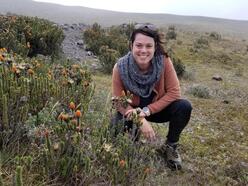
Jennifer Mandel, University of Memphis, Memphis, Tennessee
Jennifer Mandel is an Associate Professor in the Department of Biological Sciences at the University of Memphis. Dr. Mandel received her PhD from Vanderbilt University, Nashville, Tennessee in 2008 and carried out postdoctoral research in Plant Biology at the University of Georgia, Athens, Georgia before joining the faculty at the University of Memphis in 2014. Research in the Mandel Lab centers around understanding how genetic and genomic variation generate patterns of plant biodiversity. The lab focuses on the evolution and genomics of the sunflower family. At the University of Memphis, Dr. Mandel teaches courses in Ecological Genetics, Plant Ecology, Molecular Ecology and Conservation, and General Biology. She is an active member in her department and in the scientific community participating in various service roles e.g., an Associate Editor for two journals, conference organizer for Plant Genomes Online, and a steering committee member for the Tennessee Plant Conservation Alliance. Dr. Mandel has been a member of ASB since 2007 when she joined as a graduate student. She and members of the lab attend the ASB annual meeting regularly to present their research. She has served on the ASB Research Award committee including as its Chair, and she currently serves on the Human Diversity Committee helping to develop a panel at this year’s meeting for an undergrad audience about how to apply for graduate school.
Jennifer Mandel is an Associate Professor in the Department of Biological Sciences at the University of Memphis. Dr. Mandel received her PhD from Vanderbilt University, Nashville, Tennessee in 2008 and carried out postdoctoral research in Plant Biology at the University of Georgia, Athens, Georgia before joining the faculty at the University of Memphis in 2014. Research in the Mandel Lab centers around understanding how genetic and genomic variation generate patterns of plant biodiversity. The lab focuses on the evolution and genomics of the sunflower family. At the University of Memphis, Dr. Mandel teaches courses in Ecological Genetics, Plant Ecology, Molecular Ecology and Conservation, and General Biology. She is an active member in her department and in the scientific community participating in various service roles e.g., an Associate Editor for two journals, conference organizer for Plant Genomes Online, and a steering committee member for the Tennessee Plant Conservation Alliance. Dr. Mandel has been a member of ASB since 2007 when she joined as a graduate student. She and members of the lab attend the ASB annual meeting regularly to present their research. She has served on the ASB Research Award committee including as its Chair, and she currently serves on the Human Diversity Committee helping to develop a panel at this year’s meeting for an undergrad audience about how to apply for graduate school.
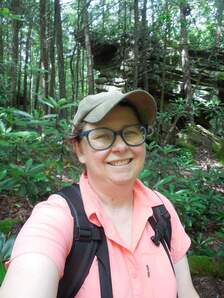
Natasha Vanderhoff, Jacksonville University, Jacksonville, Florida
Dr. Vanderhoff is an Associate Professor of Biology & Marine Science at Jacksonville University in Jacksonville, FL. She is a biologist, educator and avid birder who enjoys sharing her passion for the natural world with her students and the Jacksonville community. She earned a BS in Biology from Loyola University of Chicago (1999) and a PhD in Ecology, Evolution & Behavior from the University of Louisville (20017). Her graduate research focused on the foraging and vocal behavior of the American Robin and she is an author of the Birds of North America species account on the robin. She is a broadly trained biologist with specialization in ecology, evolution, animal behavior and ornithology. She began her career chasing primates through the jungles of Suriname, where she fell in love with tropical biology. She taught two years at Francis Marion University in South Carolina before coming to Jacksonville University in 2009. She teaches a variety of courses to majors and non-majors including Animal Diversity, Evolution, Animal Behavior, Ornithology, Vertebrate Biology, Primates, and study abroad courses in Tropical Biology. She has been a member of ASB since 2008, and along with her students, has presented annually at the ASB meeting. She enjoys exposing students to the research process at all stages, from work in the field to ASB meetings to publication. Her current research includes projects in North and South America. She continues to work with colleagues from the Carolina’s on the ecology of the margay, a near-threatened neotropical cat, at Wildsumaco Wildlife Sanctuary in Ecuador. Back home in the states her research focuses on how humans affect animal behavior, including projects on seed dispersal and anthropogenic sound pollution. She is the chair of Jacksonville University’s Institutional Animal Care & Use Committee and is a founding organizer of Science on Tap-Jacksonville, a monthly speakers series that engages the community in the importance of science in Jacksonville and beyond.
Dr. Vanderhoff is an Associate Professor of Biology & Marine Science at Jacksonville University in Jacksonville, FL. She is a biologist, educator and avid birder who enjoys sharing her passion for the natural world with her students and the Jacksonville community. She earned a BS in Biology from Loyola University of Chicago (1999) and a PhD in Ecology, Evolution & Behavior from the University of Louisville (20017). Her graduate research focused on the foraging and vocal behavior of the American Robin and she is an author of the Birds of North America species account on the robin. She is a broadly trained biologist with specialization in ecology, evolution, animal behavior and ornithology. She began her career chasing primates through the jungles of Suriname, where she fell in love with tropical biology. She taught two years at Francis Marion University in South Carolina before coming to Jacksonville University in 2009. She teaches a variety of courses to majors and non-majors including Animal Diversity, Evolution, Animal Behavior, Ornithology, Vertebrate Biology, Primates, and study abroad courses in Tropical Biology. She has been a member of ASB since 2008, and along with her students, has presented annually at the ASB meeting. She enjoys exposing students to the research process at all stages, from work in the field to ASB meetings to publication. Her current research includes projects in North and South America. She continues to work with colleagues from the Carolina’s on the ecology of the margay, a near-threatened neotropical cat, at Wildsumaco Wildlife Sanctuary in Ecuador. Back home in the states her research focuses on how humans affect animal behavior, including projects on seed dispersal and anthropogenic sound pollution. She is the chair of Jacksonville University’s Institutional Animal Care & Use Committee and is a founding organizer of Science on Tap-Jacksonville, a monthly speakers series that engages the community in the importance of science in Jacksonville and beyond.
